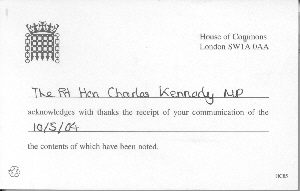|
||

Saturday
20th March 2004 - 17.00 Medically Assisted Dying
Conference notes:
i) Despite legal prohibitions,
evidence published in the Lancet suggests there are 18,000 medically
assisted deaths in the UK each year, without regulation or oversight
to protect either patients or medical staff.
ii) The current legislative framework governing medically assisted
dying - primarily the 1961 Suicide Act - is over 40 years old
and, since it was enacted, there have been huge advances in medical
science and technology, which have enabled individuals to live
longer despite debilitating illness.
iii) The legalisation in a number of jurisdictions including
Belgium, the Netherlands, and the US State of Oregon of medical
assistance to die and the advent of so-called ‘death tourism’
to Switzerland.
Conference believes:
a) Every patient should have
access to high quality palliative care, whether they are being
treated at home, in hospital or in a hospice.
b) Support for carers should be improved as advocated in Policy Paper 60, Promoting Independence, Protecting
Individuals (2003). (awaiting for new link from LibDems)
c) The current legislative framework governing medically assisted
dying is failing to protect patients, vulnerable people and medical
professionals.
d) In cases of terminal illness, or severe, incurable and progressive
physical illness where patients are without hope of recovery,
medical doctors should legally be able to provide competent adults
with assistance to die if they have expressed the wish to do
so, within the narrowly defined circumstances as set out in clauses
e), f), g) and h) below.
e) Assistance should be strictly limited to qualifying persons
able to demonstrate to the satisfaction of a doctor with detailed
knowledge of their illness, as well as an independent specialist,
that their request to die is voluntary, well-considered, persistent
and motivated by existing or inevitable unbearable suffering.
f) Requests for medical assistance to die must be made in writing,
after a full discussion with each of the doctors about the situation,
prospects and options for palliative care; they must be countersigned
by a practising solicitor who has been satisfied that the patient
qualifies for assistance to die and that all the required procedures
have been followed.
g) After the written request has been made, it must be registered
with the Commission for Health Audit and Inspection within two
working days.
h) The written request must be re-affirmed after a specific minimum
waiting period before assistance to die can proceed and it may
be withdrawn at any time.
i) The law should protect the right of medical and legal practitioners
not to participate in the process of assisting a patient to die
but, in such circumstances, and reflecting the existing BMA guidelines
governing the withholding of life-prolonging treatment, the physician
should be required to make a referral to an alternative doctor.
Conference further believes:
1. The operation of this policy should be overseen by a Monitoring Commission appointed by a Minister, chaired by a legal practitioner and including legal, medical and ethical expertise; the Commission should review the circumstances of individual deaths and refer the matter to a coroner if the procedures have not been followed correctly.
2. The Monitoring Commission should also produce an annual report on the operation of the law and make recommendations for further legal reform.
3. The legislation required to enact this policy should only be introduced to Parliament for consideration after full pre-legislative scrutiny, and should be subject to review after five years.
4. Liberal Democrat parliamentarians should have a free vote on this issue.
Applicability: England and Wales.
This motion was carried.
When this motion was passed I found Charles Kennedy's site had a contact form and asked:-
Did your Conference pass this motion not knowing that the Disability Rights Commission has decided that the legalisation of euthanasia poses too significant a threat to disabled people for them to endorse it or because the Liberal Democrats don't value disabled people's lives?
I offered to discuss it further either on the phone or in person
This was the answer he gave me together with a copy of the above document.
Gill's reply
| Rt
Hon Charles Kennedy MP Leader of the Liberal Democrats House of Commons London SW1 OAA |
||||||||||||||
| 10th May 2004 | ||||||||||||||
| Dear Charles Kennedy | ||||||||||||||
| Thank you for your reply to my email about your Party's Spring Federal conference motion about legalising medically assisted suicide. I am relieved that it will not automatically be included in the election manifesto and that you have personal reservations about it. | ||||||||||||||
| I was born with a chronic disability and have acquired a second disability in middle age that is aggressively progressive. I would therefore be well covered by the clause in the conference notes that indicates who doctors should be allowed to help die, i.e. anyone with a "severe, incurable and progressive physical illness where patients are without hope of recovery.." Although the conference notes say the person has to have expressed a wish to die, I suspect my doctors would not have needed more than a nod to take me there before now if medically assisted suicide had been legal. When I was diagnosed with the second disability the shock was huge and was felt to an almost equal extent by those close to me and the health professionals treating me. Add to that the inevitable bouts of depression when I actually did want to die and you can see that my continuing residency on this planet could have been legally foreshortened if the proposed law had already been passed. The fact that I now live a very fulfilled life contributing to society in many tangible ways indicates how wrong such legally ratified actions could be. | ||||||||||||||
| I share your belief that legalisation of medically assisted suicide, however tightly worded and monitored, would also be open to real abuse. Knowing how many doctors still use the medical model of disability, many disabled people would be effortlessly included in the "severe, incurable and progressive physical illness where patients are without hope of recovery" category even though they were not ill. In fact the categorisation used in the rationale surrounding the proposed law comes from the medical model of disability which focuses on what the person can't do. The Social model is now the preferred way of viewing disability. That focuses on how the barriers erected by society against disabled members, like stairs, inaccessible transport, inappropriate housing and discriminatory attitudes, could be removed. When those barriers are dispensed with the disabled person is no longer stopped from being a fully contributing member of society and are therefore not disabled. The belief that disabled people are all poor suffering souls who would aspire to an early death has been encouraged by people like Dianne Pretty and Reg Crew but it is very unhelpful to the majority of disabled people who are striving to be fully paid up members of normality. | ||||||||||||||
| Is there any way of changing this as party policy? Could it be debated at another federal conference? If so I would be happy to come and talk to people about the issues involved either from the platform or informally. I am aware there has been a lot of support for this issue in the media mainly driven by able-bodied people who appear to have a very misguided idea of what disability is. The vast majority of disabled people do not support such views and your party will lose a great deal of support if it continues to support medically assisted suicide. | ||||||||||||||
| You can find out more from the http://www.willtolive.co.uk web site. I have enclosed the introduction to that site overleaf. | ||||||||||||||
| With best wishes | ||||||||||||||
| Gill Gerhardi (Mrs.) | ||||||||||||||
 |
||||||||||||||

